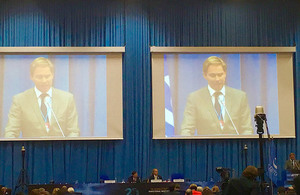UK Statement at Comprehensive Nuclear Test Ban Treaty Organisation Ministerial Meeting
Delivered by Tobias Ellwood MP, Parliamentary Under Secretary of State, Foreign and Commonwealth Office, 13 June 2016, Vienna

Mr Chairman,
[The Minister expressed his condolences for the 12 June attack in Orlando]
I am honoured to be representing the United Kingdom at this meeting to commemorate the 20th anniversary of the opening for signature of the Comprehensive Nuclear Test Ban Treaty (CTBT). I would like to add my thanks to the Executive Secretary, Dr Lassina Zerbo, for convening the meeting, whose message highlighted our duty to future generations which was also echoed in the UN Secretary General’s video message.
The United Kingdom remains a proud supporter of the CTBTO. We were one of the first signatories in 1996 and we ratified the Treaty in 1998. We host eleven monitoring stations, not just in the UK, but on St Helena, Tristan da Cunha, Ascension Island, Bermuda, and the British Indian Ocean Territory. A further station is planned at the Halley Research Station in Antarctica. We are one of the leading contributors to this Organisation, giving over 4.5 million pounds through our annual assessment, and contributing the time and resources of UK experts.
This is a collective endeavour and I would like to acknowledge the significant achievements of the CTBTO over the last 20 years.
First, we should recognise the achievement of the Treaty itself. Even without entry into force, it has made nuclear explosive tests an aberration. Only one country has disrupted this and continues to test in the 21st Century. North Korea’s actions continue to present a threat to regional and international security and we welcome the strong international response at the UN Security Council.
Secondly, we should recognise the achievement of this unique Organisation which was built by State Signatories. It may still only be provisional, but we have no doubt that it is effective. Its verification regime monitors global Treaty compliance by collecting and analysing data from stations all around the world. We saw the evidence of this most recently in the detection of the test by North Korea in January.
It is worth remembering that when the Treaty was written, no-one knew whether the International Monitoring System would actually be possible. Today we know that it is. All State Signatories have equal access to the regular data it provides. And this monitoring can only improve as the system continues to grow - it is now 89% complete. The success of the system is down to the dedication and collaboration of many countries who have established stations. We call upon member states to get the remaining stations up and running in order to ensure that the verification regime is effective right across the world.
As well as recognising the achievements of the Treaty and the International Monitoring System, I would like to pay tribute to the extraordinary technical cooperation taking place within this building. The CTBTO provides excellent opportunities for scientific collaboration and capacity building. This work has potential life-saving benefits not just in the field of verification technologies but also in other areas, such as in providing seismic data for tsunami early warning centres.
Of course all these achievements would be greatly enhanced by entry into force of the CTBT. It would be a tangible step towards a safer and more stable world. Further ratifications would demonstrate the global commitment towards ending nuclear test explosions. It would also send an unequivocal message that nuclear explosive testing will not be tolerated. There are clear advantages to all of us for entry into force. We would have a fully operational International Monitoring System and International Data Centre as well as On Site Inspections. All together, these elements would leave states in no doubt. Explosive tests could not go undetected.
Excellencies, ladies and gentlemen, my message is very simple. We fully support the CTBTO and pay tribute to its achievements over 20 years. But there is more to do. The United Kingdom calls upon all States that have not yet done so to ratify this treaty, and to bring it into force. Together, we can end explosive nuclear testing.